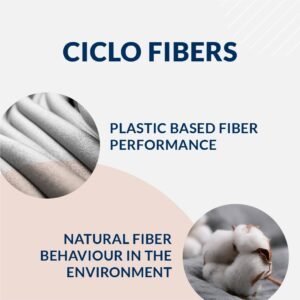Carrington Textiles is the largest producer of workwear fabrics in the UK, exporting to more than 80 countries worldwide. Carrington Textiles has announced its focus on the promotion of Orca and Hawksbill, as well as on their latest flame retardant addition, Flamestat 250, at Techtextil 2022. Orca and Hawksbill are the results of the biodegradable technology of Carrington to produce workwear fabrics. These two fabrics are made following Carrington Textiles’ usual rigorous quality standards, so they not only offer the best performance and durability to the end-user but also greatly reduce their impact on the environment when the life of the garment comes to an end.
Hawksbill’s composition includes 65% CiCLO polyester and 35% organic cotton. While Orca incorporates 26% recycled CiCLO polyester, 29% virgin CiCLO polyester, and 35% Better Cotton. Hawksbill and Orca are the sustainable alternative to the company’s bestselling fabric, Tomboy.
 Recently launched during their ‘Weaving Sustainability into our Fabrics’ campaign, where the company released their newest fabrics Constance 210, Balaton 255, Kielder 185, Delamere (210 & 245), and Rivington (205 & 220), Carrington Textiles’ Orca and Hawksbill stand out for their addition of the new CiCLO fiber. The CiCLO technology is a sustainable textiles ingredient in the form of an additive that is combined with polyester at the very beginning of the fiber-making process. When CiCLO polyester ends up in the environment either through washing or end of life of the garment, it behaves like natural fibers, in turn reducing microplastic pollution and textile accumulation.
Recently launched during their ‘Weaving Sustainability into our Fabrics’ campaign, where the company released their newest fabrics Constance 210, Balaton 255, Kielder 185, Delamere (210 & 245), and Rivington (205 & 220), Carrington Textiles’ Orca and Hawksbill stand out for their addition of the new CiCLO fiber. The CiCLO technology is a sustainable textiles ingredient in the form of an additive that is combined with polyester at the very beginning of the fiber-making process. When CiCLO polyester ends up in the environment either through washing or end of life of the garment, it behaves like natural fibers, in turn reducing microplastic pollution and textile accumulation.
CiCLO® textiles dupe microbes into thinking synthetic microfibers are natural fibers
The technology is by blending countless biodegradable spots of CiCLO throughout the matrix of the plastic. These spots act like nutrient sources for microbes that naturally exist in the environment. That means, that when textiles made with CiCLO®-enhanced fibers end up in environments where biodegradation can occur naturally, microbes are attracted to the fibers and can mineralize them at rates comparable to natural fibers, such as wool.



